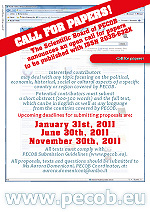Una semiotica del nazionalismo: la Primavera Slovena (1987 – 1992)
February 2012 | #20
by: Mr. Matteo Albertini
Ph.D. in Semiotics
University of Bologna
pp: 35
ISSN: 2038-632X
Abstract
This paper analyzes social and political movements that emerged in Slovenia in the last years of socialist Yugoslavia. Explicitly or impliedly, any of them was contesting the inability of the Federation to find a solution to the problems Yugoslav peoples were experiencing: lack of civil rights, high unemployment and economic crisis.
Many foreigner observers considered Slovenian protests as an intellectual and fairly spontaneous reaction to the contradictions of the socialist regime, in a world moving towards the fall of the Berlin wall. Not by chance it has soon been labeled as the “Slovenian Spring”, using a term frequently associated with democratic movements in Eastern Europe; an evocative definition which indeed underlines some aspects of the transformations they caused: the transition to a multi-party political system, the opening of the institutions to civil society, the fight against the corruption and the centralism of the Yugoslav regime.
But a similar interpretation describes just a part of the story, and does not help to understand the following evolution of Slovenian movements, from the democratic and liberal ideals of the first two years (1987-1989) to the national-secessionist tones of the beginning of the 90s.
The Slovenian Spring is then a peculiar case-study to identify a central feature of contemporary nationalism: its ability to connect history, politics and everyday life in a single narrative, in which every member of the nation, and nobody else, is involved.
From this point of view, fulcrum of the development of a sloven nationalism was the 1990 electoral campaign, the first that saw the admission of non-communist parties, when the need to mobilize voters towards independence became crucial.
Nationalism was not a destiny of sloven population, indeed; but at the same time it was not a simple reaction to the rise of an aggressive and opposite nationalism like the Serbian one, as it was described. It seems rather a complex consequence of many factors, bond together by the assumption that, being these movements constitutively “right” as defenders of democracy and fighters for freedom, they were right also when they claimed the primacy of sloven identity on Yugoslav multiculturalism. This transition set the ideal conditions for the birth of an ethnic nationalism even in the Republic usually considered the most “western” of Yugoslavia, which later became the first to access to European Union.
Some months later, the brief July war contributed in polarizing the sloven society against Yugoslav institutions and opening the way to independence.
In this perspective, the analysis of the Slovenian Spring hides a clue to shed a light on the whole dissolution of Yugoslavia and the following bloodshed. It shows the way in which national themes could appear in public discourse, override liberal and democratic issues and impose the logic of ethnic identity as the only suitable for establishing a long-lasting peace.
In fact, Sloven independence has been made simpler by the homogeneity of the sloven population and the lack of signifying ethnic minorities on Slovenian territory; in other words, it did not impede the quest for the Great Serbia Slobodan Milošević was pursuing in the rest of the Yugoslavia.
Keywords
Slovenia; nationalism; Yugoslavia; civil society; semiotics
Table of contents
Abstract
Keywords
1. Introduzione
2. Il contesto socio-culturale sloveno negli anni Ottanta
3. Una “nuova idea”: società civile e nazionalismo in Slovenia
4. Meccanismi intertestuali: la creazione della differenza
5. La definizione dell’”altro da sé”.
6. La polemica con l’altro
7. La definizione del sé
8. Di nuovo i Balcani: stereotipi e cambiamento politico
9. Conclusioni
Bibliografia
To download this paper, please surf the parent section on PECOB's portal.
Mr. Matteo Albertini
About the author
Matteo Albertini is a Ph.d in Semiotics at the University of Bologna. He discussed in last February his doctoral thesis on the discursive construction of Yugoslav nationalisms in last thirty years, and presented articles and essays on this subject in many italian and international publications. He is currently working editor in the magazine balkanalysis.com.
Write to the author of this paper This e-mail address is being protected from spambots. You need JavaScript enabled to view it







 United States
United States Unknown
Unknown Alexa (IA Archiver)
Alexa (IA Archiver)


